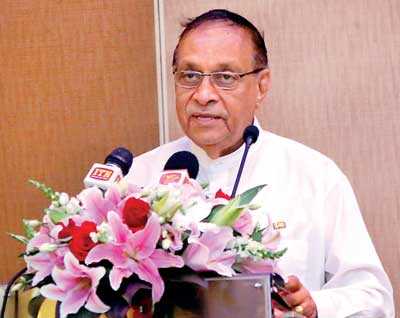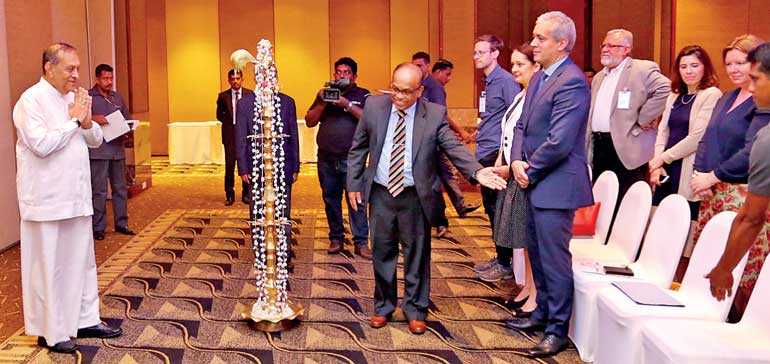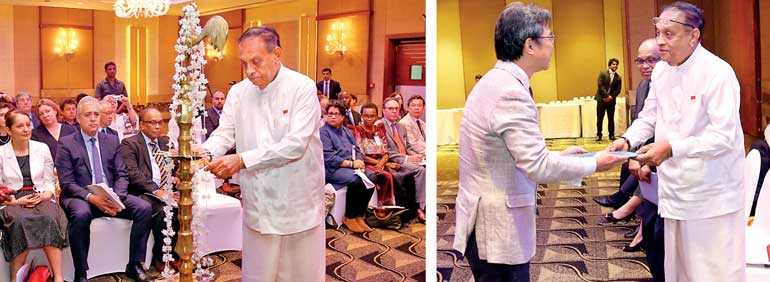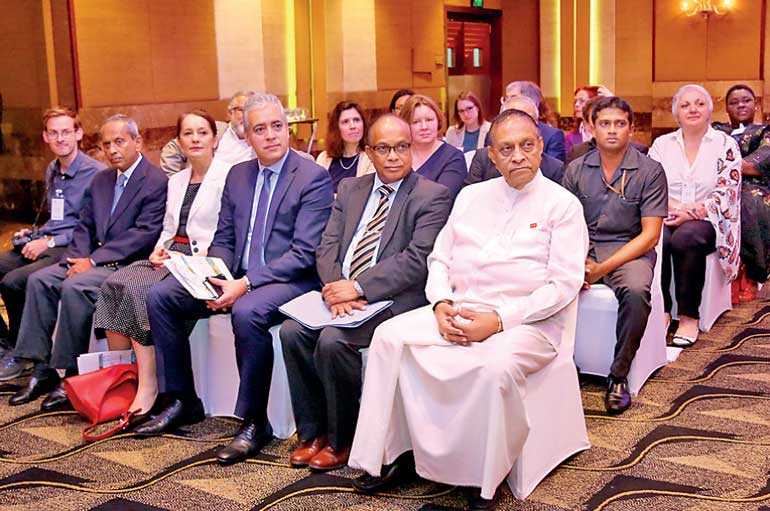Saturday Feb 21, 2026
Saturday Feb 21, 2026
Wednesday, 13 June 2018 00:03 - - {{hitsCtrl.values.hits}}

The Inaugural Session of the International Steering Committee of the Global Partnership for the Prevention of Armed Conflict was held last week in Colombo. Here is the Keynote address by Speaker of Parliament Karu Jayasuriya
It is a pleasure to be here with you this morning, and I thank the Executive Director of the Regional Centre for Strategic Studies for inviting me to share my thoughts on the importance of prevention rather than countering armed conflicts.
I must also thank the Global Partnership for the Prevention of Armed Conflict (GPPAC) for choosing Colombo as the venue for this important meeting of the International Steering Committee.
Ladies and gentlemen, I am sure you have all heard the simple proverb “prevention is better than cure”, or in other words “an ounce of prevention is worth a pound of cure”. Very simple words which carry a deep and powerful message.
These words apply to everything in life including situations of armed conflict, and I don’t think anyone needs convincing regarding the importance of preventing armed conflict as opposed to countering armed conflict. Yet, looking around at the world today, one wonders what it is that prevents people and leaders at different levels, including some religious leaders, from comprehending this simple truth.
Two world wars don’t appear to have made us wiser. Or is it that the painful memories of not so long ago have already been forgotten?
Sri Lanka’s share of conflict
Ladies and gentlemen, as you all know very well, Sri Lanka has had its own share of conflict. Two youth insurrections and nearly three decades of violence related to separatism, have taken an unimaginable and inexplicable toll on our nation’s post-independent development and progress.
Unfortunately, we failed to seize the moment immediately following the end of the conflict in May 2009, to work on introspection and healing based on consultative approaches inclusive of all victims. The approaches followed were often ‘top-down’ initiatives, with the Government of the day taking decisions that it thought were best for the security forces, the families of missing security forces personnel, the families of missing civilians, the injured, the war widows and others. There was resistance to consult; there was resistance to learn from the examples of others; and there was resistance to obtain assistance from international organisations and experts.
Ladies and gentlemen, appointment of boards and commissions of an ad hoc nature which was done throughout our tormented post-independent history of 70 years, to deal with the southern insurrections as well as issues relating to the north and the east, failed to address real issues of concern of the people, and find solutions that would sustain peace.
I am convinced that consultative ‘bottom-up’ processes which also involve required changes to the constitution; establishment of permanent, empowered independent institutions; law reform; adopting good governance practices; and the nurturing of a society that respects individual rights, and acknowledges and appreciates the importance of resolving problems through means other than conflict – that is, through consensual approaches and democratic means, in a spirit of tolerance, accommodation and compromise – are essential to ensure prevention and non-recurrence of conflict.
Government approach
Following the January 2015 presidential election, the National Unity Government has taken a victim-centric, consultative and ‘bottom-up’ approach to reconciliation and healing, with the clear objective of ensuring non-recurrence of conflict. Yet, the challenges to the processes that we have initiated are many, and too numerous to address in detail here.
When I dwell on the problems that Sri Lanka faces as a conflict scarred nation that is determined to work on ensuring non-recurrence, and the problems and challenges that other countries, communities and societies face, what often comes to mind are the words in the UNESCO Charter –
“since wars begin in the minds of men, it is in the minds of men that the defences of peace must be constructed;
ignorance of each other’s ways and lives has been a common cause, throughout the history of mankind, of that suspicion and mistrust between the peoples of the world through which their differences have all too often broken into war;
the war which has now ended was a war made possible by the denial of the democratic principles of dignity, equality and mutual respect of men, and by the propagation, in their place, through ignorance and prejudice, of the doctrine of the inequality of men and races;
the wide diffusion of culture, and the education of humanity for justice and liberty and peace are indispensable to the dignity of man and constitute a sacred duty which all the nations must fulfil in a spirit of mutual assistance and concern;
that a peace based exclusively upon the political and economic arrangements of governments would not be a peace which could secure the unanimous, lasting and sincere support of the peoples of the world, and that the peace must therefore be founded, if it is not to fail, upon the intellectual and moral solidarity of mankind.”

Finding meaningful solutions
Ladies and gentlemen, human beings are intelligent. We are capable of using our intelligence to create problems, and we are equally capable of finding meaningful solutions to problems. We are capable of causing misery. But we are equally capable of compassion and healing. This capacity was amply demonstrated by Gautama Buddha as far back as over 2,600 years ago when he explained ways for human beings to heal themselves, their surroundings, and each other.
What is important, I think, is for individuals to commit and resolve to use their intelligence in constructive ways. The words in the Charter of UNESCO, the words in all our religious texts – all these commit to the same, and help us, if we are sincere, to find ways to imbibe in our children, and in our people, the values of equality, respect, tolerance, empathy, personal integrity and appreciation for what unites us as human beings.
Parents, teachers, the media, religious leaders, business leaders, trade unionists, community leaders, politicians, and each and every individual human being have a role to play in ensuring the prevention of conflict at a micro and macro level. It is not something a Government alone can do at national level, through ‘top-down’ approaches, regulations, orders, strictures and censorship.
The key, I think, is to take individual ownership. To seek ways to ensure that each human being is driven by his or her conscience to care for others, to be concerned about others, to respect others and treat each and every one with dignity, and share a vision of a better class room, a better school, a better community, a better work place, a nation, and a better world where every human being is considered equal; and his or her individual rights are respected, valued and upheld; where development is sustainable and inclusive; and the rule of law is impartial.
Violence, abusive language, hatred and the use of force should not be considered as options for resolution of problems. Instead, it is necessary to resolve as individuals, as communities, and as nations, to find solutions to problems through dialogue, cooperation, mutual appreciation, and respect for the rule of law.
We in Sri Lanka are still looking for answers. Even after long years of conflict, where everyone in our country irrespective of race, religion, and language has suffered, and we have all suffered collectively as a nation due to economic loss, some in our country still refuse to look at what unites us as human beings and resolve to rise up to work together for our common good.

Accepting diversity
Ladies and gentlemen, as cultures and peoples in the world are today brought closer together in physical terms through technological advancements, air travel and trade, we must face the challenge of accepting diversity as an inevitable reality, and focus on what unites us including the need to care for our planet which is our common and only home.
It is necessary that international organisations including organisations like yours must look for ideas, and methods and tools that schools, communities, States, media organisations, as well as individual citizens can use to identify and respond to warning signs as a way to pre-empt the eruption of violence. Learning from each other, and sharing best practices can be important in this regard.
At an international level, and even at a national level, it is often still after violence erupts that one steps in, reacts, and intervenes. In the means used to prevent further escalation of a violent situation, it is possible that violations of human rights can occur, leading to even greater cycles of violence as communities may feel targeted, victimised and aggrieved.
Prevention therefore, must always hold a level of importance and priority that is equal to resolving current conflicts and rebuilding post-conflict states.
Organisations like the Global Partnership for the Prevention of Armed Conflict, which brings together civil society organisations from across the world, is crucial in this task.

Citizens’ role
Now more than ever, in an era of social media, citizens have a far greater role than before in everything, including influencing the decision-making processes with regard to the use of force or otherwise by governments, and in responding and reacting to conflict, inciting or quelling hatred and intolerance.
In an era of social media where mobilisation of the citizenry is possible within a matter of minutes, and the tools to enlighten and inform the masses lie at one’s fingertips, it is imperative that we use these innovations for the betterment of our societies, to ease tensions and build trust across all sections of society.
These new communication tools can be a source for dialogue, for outreach beyond our communities, and a tool for healing deep-rooted mistrust and misconceptions. Civil society has an important role to play in these endeavours.
Ladies and gentlemen, despite Sri Lanka’s violent post-independence history, I have many reasons to be optimistic for our future. I firmly believe that it is important that we look to the future with optimism. Without optimism, without hope, without focusing on the positive, we cannot dream or envision ways and means of charting our way forward to build the peaceful, reconciled, stable and prosperous nation that all our citizens deserve and yearn for.
We have challenges to overcome, and we have wounds to heal, but, I have faith that we are finally on the right path.
The media, unfortunately, tends to always paint a picture of doom and gloom. Perhaps doom and gloom sell better, and get them better ratings than what will inspire hope. So they fail to say things that will make each citizen feel that he or she is equally wanted, and has a role to play in building this peaceful, reconciled, stable and prosperous nation that we envision.
Every citizen, despite his or her age, gender, and ethnicity, has an important role to play in their schools, their communities, their workplaces, their homes, their offices and in their daily interactions and tasks that they perform on a daily basis. Everyone has a role in creating a responsible, disciplined, peaceful, stable, reconciled and prosperous society.
Strengthening democratic institutions
The current administration under the leadership of President Maithripala Sirisena and Prime Minister Ranil Wickremesinghe are committed to strengthening our democratic institutions. In fact, as the Chair of the Constitutional Council that is responsible for appointments to the independent commissions, I am delighted that just last week, Sri Lanka’s Human Rights Commission was once again re-accredited with ‘A’ status by the Global Alliance of National Human Rights Institutes. This is an important achievement for the Commission, as well as the Government, our people, and our nation.
The political space that has opened up presents us with an opportunity to address concerns and issues in a non-violent and responsible manner. As a result, I am happy to be able to preside over a Parliament, which has in the truest sprit of democracy, found voice and relevance.
The JVP which was the protagonist in the uprisings of 1971 and 1987 is now very much part of the political mainstream. In fact, they have often acted as custodians of democratic values and institutions and watchdogs against corruption. The JVP, even while still a minor party represented in Parliament, has been at the forefront of delivering national reforms that have strengthened our democracy through their support for the 17th and 19th Amendments to the Constitution. I believe the JVP stands as resounding proof of the transformative power of individuals and organisations when an opportunity is granted for this kind of change and reform.
The constitutional reform process that is currently underway which is a ‘bottom-up’ and all-inclusive process aspires to address problems of the minorities, ensure the equitable and just sharing of power and resources among all people of Sri Lanka, and address discriminatory provisions in the existing constitution.
It is hoped that a new constitution will address social inequalities and deliver on a promise of social justice. The Tamil National Alliance, the main Opposition Party in Parliament is an active participant in these processes. We have thus come a long way since the end of the conflict, and representatives of all communities are active stakeholders in shaping Sri Lanka’s future.
The current Parliament has also enacted several important pieces of legislation including on the Right to Information, Witness and Victim Protection, Criminalising Enforced Disappearance, and the establishment of a permanent Office on Missing Persons.
Voices of reason
Despite the frequent bellowing of a few loud voices raised in hate and intolerance, both within the country and beyond its shores, it gives me solace that the voices of moderation, restraint, compassion, empathy and tolerance have not been silenced by them.
We witnessed the power of these voices of reason and moderation during the recent unfortunate incidents of violence in Kandy. When certain extremist elements attempted to orchestrate violence against our Muslim brothers and sisters, it was these voices of reason that prevailed over the screams of hatred.
Possible escalation of violence was averted by the timely intervention of the clergy, community leaders, and members of the civil society. Even in moments of despair such as this, I was heartened by the knowledge that Sri Lankans had learnt bitter lessons from our past and would do everything possible to avoid repetition.
Ladies and gentlemen, I wish you a pleasant stay in Sri Lanka and I hope your deliberations will be constructive and meaningful, and I look forward to learning through the RCSS of the outcome of your deliberations.